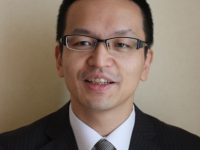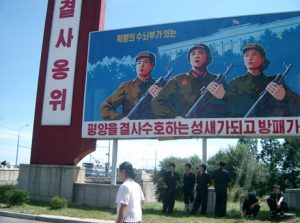Memo #300
 Most observers expected that the seven high officials accompanying the motor hearse of Kim Jong-Il the Supreme Leader of the Democratic People’s Republic of Korea in December 2011 would become the core support of the young successor, Kim Jong-Un. Some even saw the possibility of the North Korea ruling system transforming into a collective leadership. Still others warned of state collapse. However, since then, the two most powerful figures and would-be guardians have been removed: Ri Yong-ho, Chief of the General Staff of the Korean People’s Army, was dismissed, while Kim Jong-Un’s powerful uncle, Jang Song-taek, was reportedly executed. Is political decision-making now being concentrated under Kim Jong-Un?
Most observers expected that the seven high officials accompanying the motor hearse of Kim Jong-Il the Supreme Leader of the Democratic People’s Republic of Korea in December 2011 would become the core support of the young successor, Kim Jong-Un. Some even saw the possibility of the North Korea ruling system transforming into a collective leadership. Still others warned of state collapse. However, since then, the two most powerful figures and would-be guardians have been removed: Ri Yong-ho, Chief of the General Staff of the Korean People’s Army, was dismissed, while Kim Jong-Un’s powerful uncle, Jang Song-taek, was reportedly executed. Is political decision-making now being concentrated under Kim Jong-Un?
The clearest answer is that politics under Kim Jong-Un is even more of a black box than was the case under his father. This is due in part to the relative paucity of data—after all, Kim Jong-Un has only been in power for two years. More importantly, there is less information leaking out than before, despite the evolution and proliferation of information satellites. While his father had close relatives, advisors, and even his former Japanese sushi chef all recount the extent of his absolute power and ruling style, no similar testimonies have emerged regarding Kim Jong-Un.
From the content of North Korean media, we can discern that the Korean Workers’ Party has become more central in state affairs than it was under his father, more attention is being paid to the appearance of due process in policy-making, and there have been relatively more attempts to publicly disclose information. But personnel affairs and policy changes have been slapdash and foreign policies have fluctuated widely between provocation and dialogue.
But despite being treated as an international pariah, North Korea has succeeded in establishing diplomatic relations with more than 80 percent of the world’s countries. Its economy is recovering due to support from China and South Korea, while at the same time domestic social controls are becoming stricter. The official media agency continues to propagandize to enhance the authority of the Supreme Leader.
There is simply insufficient information to know whether these developments will allow for the perpetuation of the Kim family dynasty. But one lesson can be drawn from the past twenty years: we should not generate policies based on wishful anticipation of an immediate breakdown of North Korea’s political system just because of an informational black box.
Memo translated from Japanese by Nanami Akimoto
About the Author:
Isozaki Atsuhito, an assistant professor at Keio University, is a leading expert on research into North Korea’s politics based on a detailed analysis of the country’s state-run media. He studied abroad at Seoul National University Graduate School in South Korea and served as a senior researcher for the Japanese Embassy in China.
Links:
- Isozaki Atsuhito, “Kim Jong Un indicates a willingness for dialogue with South Korea,” Asahi Shimbun, January 2014
- Isozaki Atsuhito, and Sawada Katsumi (eds.), Kita Chōsen nyūmon [An introduction to North Korea], 2010 (in Japanese)
- Okonogi Masao and Isozaki Atsuhito (eds.), Kita Chōsen to ningen no anzen hoshō [North Korea and Human Security], 2009 (in Japanese)
- Hyung-Gu Lynn, “Assessing Political Stability in Post-Kim Jong-Il North Korea,” Korea Economic Institute Academic Paper Series, December 2012
- Jack Kim and Ju-Min Park, “North Korea building collapse may reveal Achilles heel of Kim’s regime,” Reuters, May 2014
Related Memos:
See our other memos on North Korea.

Comments are closed, but trackbacks and pingbacks are open.